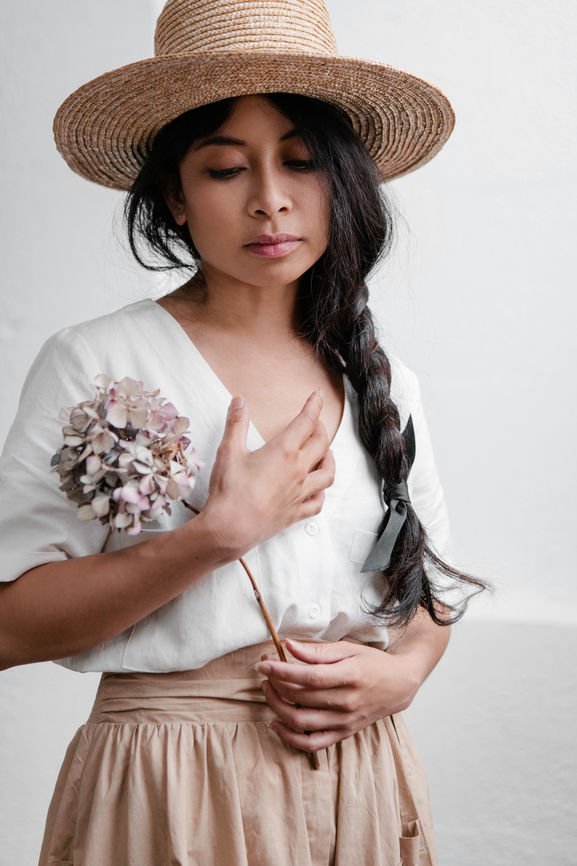
Resources For Finding Peace Amidst Anxiety & Depression
Disclaimer: This is not medical advice and is based only on personal experience. Anyone experiencing anxiety and/or depression should seek help from a medical professional.
Self-Care Rituals For The Hard Days
More than 40 million adults experience anxiety and/or depression in the United States. I am one of those people.
“It started when I realized certain events or transitions would trigger a heaviness that lived in my chest and made it more challenging to breathe.”
My journey with depression began as early as I can remember, and then anxiety showed up to the party sometime in my twenties. I don’t know why—life events, genetics, and even the change of seasons can trigger mental illnesses. All I know is that for years I suppressed everything.
It started when I realized certain events or transitions would trigger a heaviness that lived in my chest and made it more challenging to breathe. A thick fog replaced my thoughts, and it would take all of my effort to navigate through the day as usual.
But I pretended I was fine and numbed my pain by burying myself in caffeine and work, in Netflix and wine. I knew something was wrong and that experiencing frequent mood swings and mental fogs wasn’t normal, but I didn’t have a vocabulary for what I was feeling. No one I knew had anxiety or depression. It wasn’t something I’d ever talked about with family or friends. It took therapy and years of overcoming mental health stigma before I could name what was going on inside of me.
“Eventually, through various self-care practices, I found balance, as well as my voice.”
It was an abrupt transition once I finally came to terms with everything. I exchanged denial for despair and spent most of my free time on the couch or in bed. For a while, I felt the weight of everything at once, and I found myself drowning in the pain I had suppressed for so many years. Eventually, through various self-care practices, I found balance, as well as my voice. I began to acknowledge my struggles with mental health while also maintaining safeguards to avoid downward spirals.
Outside of seeking therapy—a privilege and something I believe we should all have access to—I’ve adopted a few practices to help me navigate the harder days. These rituals have been invaluable when consistent therapy is outside of my budget, and they are also effective when my anxiety or depression is controllable, but I still don’t feel entirely like myself.
These practices are in no way “cures,” and I’m not suggesting you use them as substitutes for medication without consulting your therapist or doctor. What I am offering is a list of self-care rituals and resources that have served me in challenging moments. I share them here as an offering; may they gift and guide anyone who needs them towards healing.
Self-Care Practices For Finding Peace
1. Enlist a Safe Person
“Your community loves you. They want to be there for you.”
I have two safe people in my life: a dear friend who also experiences anxiety and depression, as well as my partner. They both recognize the signs for when I’ve entered a dark headspace. Both also know how to talk me through these moments, as well as how to listen. It’s comforting to know I can trust and lean on both of them.
If you’re experiencing challenges, tell the people closest to you. That may seem daunting, but confiding in someone aside from your doctor or therapist breaks the stigma and releases you from silence and inferred shame. It also gifts you a safe space for harder days.
If telling someone feels too overwhelming, ask your therapist or doctor for help. They can guide you through the conversation with your loved ones so that you have daily support.
2. Eat Nourishing Foods
One of the most challenging things for me to do when feeling depressed or anxious is to eat food, let alone nourishing foods. If I do manage to eat, I want to numb my feelings with sugar and alcohol.
“Share community-style meals to encourage eating and conversation.”
If you have roommates or live with a partner, talk to them about what you’re going through and ask for their help with meals during the hard days. Share community-style meals to encourage eating and conversation.
I’ve also found it essential to keep nutritious foods and ready-made meals in my house so that, when I don’t have the energy to cook, I can turn to pre-made meals and prepped veggies. I highly encourage this, especially if you live alone.
3. Drink Water + Calming Beverages
“Try calming teas for relieving anxiety and aiding restful sleep.”
I’ve started a habit of keeping a large water bottle by my bed at night. I drink it first thing each morning when I’m still half-asleep and unable to assess my mental state. Having a physical task to complete, especially one that serves my body and brain, positively impacts my morning mood and how I take care of myself for the rest of the day.
I’ve also set healthier alcohol boundaries—like not drinking when alone or as a reaction to what I’m feeling. Try calming teas for relieving anxiety and aiding restful sleep. I especially love making this ashwagandha sleep tonic before bed.
4. Embrace Creative Practices
One of my safeguards is spending time on creative projects. This is especially important on the days when I don’t feel like myself. I’m a writer; words bring me home. If I can’t do anything else in the day, I take the minimal energy I have, and I write.
“Ceating is about releasing thoughts and feelings, and it’s a way to funnel out the emotions swelling inside.”
Anyone can create as a way to channel emotions. There is writing, art therapy, music, and dance. Creating isn’t only about art, though; it’s about releasing thoughts and feelings, and it’s a way to funnel out the emotions swelling inside.
5. Breathe
This one is simple, and is something I try to do whenever I feel anxious: I breathe deeply.
“This practice is especially helpful when I am experiencing anxiety in a public space.”
I stop whatever I’m doing, close my eyes, relax my body, and take 10 deep breaths. This practice is especially helpful when I’m experiencing anxiety in a public space, like while riding the bus or standing in a crowded room. It helps me to feel more relaxed, aware, and at peace. These breathing apps are also helpful for reducing anxiety.
Remember, you are not alone. As dark and lonely as this path can sometimes seem, others are walking alongside you. I am walking alongside you.
If you feel safe and comfortable sharing, I’d love to hear about your resources and rituals for navigating mental health in the comments below. 💛
RELATED READING
Kayti Christian (she/her) is an Editor at The Good Trade. She has a Master’s in Nonfiction Writing from the University of London and is the creator of Feelings Not Aside, a newsletter for enneagram 4s and other sensitive-identifying people. Outside of writing, she loves hiking, reading memoir, and the Oxford comma.

